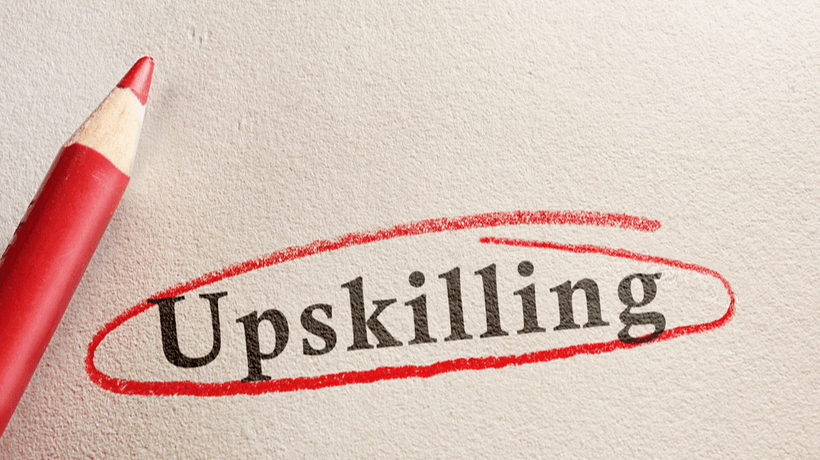With Focused Upskilling, You Can Get Ahead In 2021
Our work and personal lives have gone through tremendous changes in the past few months. But with change, comes the opportunity to transform—to start anew, reset the status quo, and become equipped to deal with a new world.
New World = New Skills
The world as we knew it pre-2020 is gone. Too much has happened for our society, businesses, and governments to return to the way they were before. Instead, they need to adapt, and that requires new skills. Take, for example, the drastic acceleration of digital transformation. It’s been fast-forwarded by five years due to the pandemic and global lockdown. 58% of workforces report skill transformations since the onset of the pandemic.
Businesses and individuals will be ill-equipped to deal with further disruption in 2021. Opportunities will pass by due to a lack of people with the right skills. We’ll have to grapple with new roles, new ways of working, new industries—not to mention, the increasing prevalence of automation, Artificial Intelligence (AI), and other emerging technologies. Long term, businesses also have to consider how they will use technology as a competitive advantage and the skills they must develop now to achieve this. Indeed, as many as 375 million workers (14% of the global workforce) will need new skills by 2030 due to emerging technology. This need hasn’t disappeared because of the pandemic but actually accelerated.
Bad Timing
Yet, this critical need to upskill couldn’t have come at a worse time for many businesses. Budgets are being slashed right, left, and center in order to survive. Half of global workers say that their organizations have cut learning investment in the wake of the pandemic. And that’s a short-sighted approach that will have knock-on effects on productivity, retention and, ultimately, recovery.
How can this be done when resources are tight? The urgency to upskill has not abated, indeed it has become more acute, which means HR and learning leaders must become savvier in equipping their people with the right skills and opportunities, in more cost-effective ways.
Understanding Skills
The skills needed by a business at any one time will evolve continuously. They can be influenced by role, industry, country, and each business’s unique needs. For example, overall, the top 10 skills needed in 2021 (globally and across all industries) are ranked as follows:
- Advanced IT and programming
- Leadership and management
- Communication and negotiation
- Entrepreneurship and initiative-taking
- Project management
- Creativity
- Advanced data analysis and mathematics
- Critical thinking and decision-making
- Adaptability and continuous learning
- Technology design and engineering
Yet, break this down by country and you’ll find that Germany has more emphasis on social skills, like leadership and negotiation. Likewise, Australia ranks leadership, entrepreneurship, communication, and continuous learning in its top five.
Similar trends are found by sector, with healthcare, in particular, standing out for managing people—unsurprising given the teamwork involved in tackling COVID-19. Cognitive skills such as creativity and critical thinking also underpin the life-and-death decisions healthcare professionals have to make every day.
Seeing The Details
Therefore, leaders must get into the granular detail of what skills a team needs for different projects to fulfill a business strategy and for future-proofing. This depth of insight will prove invaluable, as it pinpoints exactly where to focus upskilling efforts and prioritize budgets. And this kind of data is likely already at your fingertips in the form of skills data in learning platforms, HR systems, and recruitment systems.
Using Skills Data
However, there is a difference between being available and being accessible. Many HR and learning platforms store data in disparate systems and formats. Some groundwork will have to be done to ready data for analysis. Plus, many learning and HR professionals don’t have the time to sift through reams of results, so displaying the data in an easy-to-understand format (like a dashboard or infographic) will also prove worthwhile.
Skills data can also be overlaid with other insights, such as individual learning preferences and the kind of learning content being consumed. We all learn in different ways, whether that’s listening to a podcast, reading a book, watching videos, or consuming bite-sized learning. A quarter of Americans prefer non-degree training over traditional college courses, for example.
Nearly 4 in 10 workers use User-Generated Content to share knowledge and learn from their peers. A big bonus of accessing a breadth of learning content is that you can often find free or low-cost options such as online articles, TED Talks, or forums.
Again, this increases the efficiency of your upskilling program. You’ll know exactly what skills your people need to learn and how they are likely to learn them. Then you can tailor your learning content accordingly. It’ll make learners more likely to engage at a time and in a format that suits them best.
Getting Ahead In 2021
This coming year will require your organization and people to bring their "A" game. To do their best work, your people will need the right skills. Practically, however, many businesses may not have a lot of resources to commit to this. So, they need a more cost-effective approach. Skills data enables this by helping leaders identify where resources are needed most to fulfill their business goals. Diving into your skills data can help you upskill people in their most critical skills today in order to better prepare them for tomorrow.









